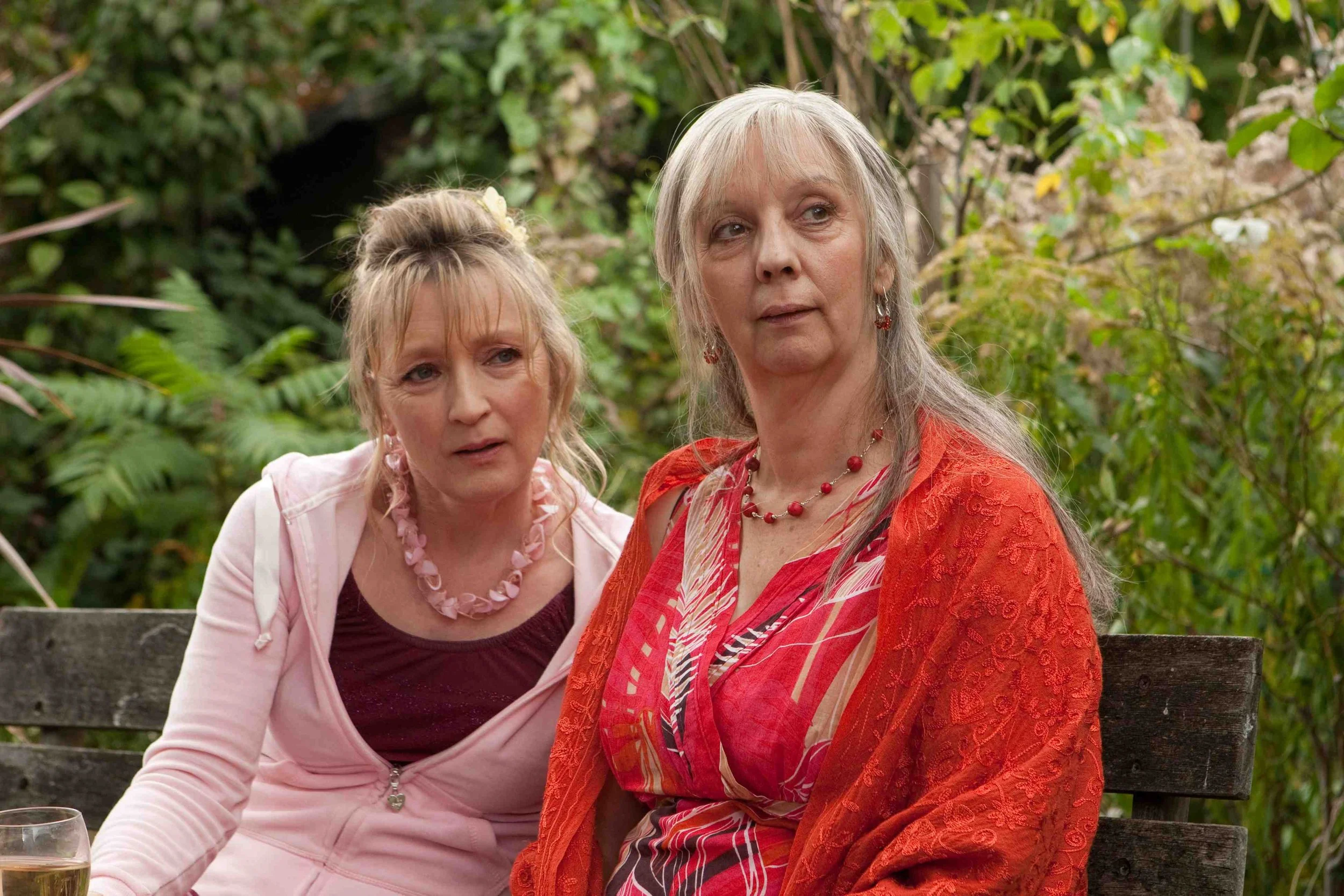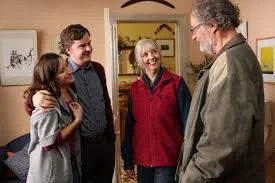THE UNEXPECTED: Mike Leigh's ANOTHER YEAR (wri & dir by Mike Leigh, w/Lesley Manville, Ruth Sheen, Jim Broadbent, 129 mns, UK, 2010)
The miracle of Mike Leigh movies is how he and his team of collaborators refuse to lean into the expected.
Every time you worry that a scene will go a certain way, the Leigh ensemble manages a way to unpredictability. They create a bridge of empathy and openness in this rigor and we, the audience, cross it.
ANOTHER YEAR follows a stable, happy older couple (Ruth Sheen and Jim Broadbent) across four seasons as they open their home to their son, family, and friends and the associated problems they bring in; Mary (an otherworldly brilliant Lesley Manville) is such a hot mess she soon becomes the focus of the movie though traditionally she would be a supporting player.
Gerri (Sheen), a therapist, and Tom (Broadbent), a geologist, have the kind of lucky life we all aspire to by late middle age: they have a home, a good relationship with their slightly odd yet good hearted son Joe (Oliver Maltman), a 30 year old lawyer, an affectionate relationship with each other. Their friends and relations view the couple's home as a shelter from the storm.
Director Leigh has made a career out of movies that reveal the profoundness of day to day existence-LIFE IS SWEET, NAKED, SECRETS & LIES, CAREER GIRLS, HAPPY GO LUCKY, HIGH HOPES, HARD TRUTHS. Before that he was making incredible BBC TV movies that did the same-MEANTIME, NUTS IN MAY, ABIGAIL'S PARTY, etc.
His process is one of the most mysterious in the business. He speaks to his actors (many part of an informal Mike Leigh repertory that includes Jim Broadbent, Timothy Spahl, Ruth Sheen, Lesley Manville, etc) and they pick out characters they'd like to explore. They then improvise, explore those characters until a story emerges. They then improvise scenes over and over until Leigh takes the work and begins to shape it into dialogue and, at some point, after months and months of rehearsals and exploration, they shoot the movie. By the time they shoot the movie, the scenes are locked in.
In his mid to later period, Leigh has gotten more ambitious yet kept this process and produced period bigger canvas work like TOPSY TURVY, MR. TURNER, PETERLOO, VERA DRAKE.
The constant in the work has been Leigh's preternatural ability to smell a cliche or "we've seen this scene" before type moment and mercilessly root it out in favor of something better.
But he doesn't do wild and unexpected just to go against expectation. That approach can itself lead to eye rolling and groaning or whiplash. His movies often build to emotional catharses and climaxes that can stand head to head with the best screenplays and cinematic works.
At first, ANOTHER YEAR feels like it might be minor Leigh. And for some, it has been categorized as such though if such a thing exists, this writer hasn't seen it-every Leigh movie is good to great. What ANOTHER YEAR is, is deliberate. Its intentional construction builds to a perceptive ambivalent and humane climax.
Lesley Manville’s Mary, perpetually trying to convince herself, and those around her, that her life is great becomes the supporting character friend who becomes the main character.
Gerri and Tom have friends like Gerri's co-worker Mary (Manville), a kilometer a minute talker, who is compulsive in her rat-a-tat-tat about how happy she is while everyone else can see she's a desperate wreck. Tom's friend, Ken (Peter Wight-they're all great in this one), is smoking and drinking and eating himself towards a heart attack. Mary thinks maybe she and Joe, the son, might be able to have a thing (instead of noticing the available if imperfect Ken).
Later we meet Tom's brother, Ronnie, a silent monosyllabic unhappy man who has just lost his wife, but seems lost in life in general.
Though the movie is heightened (it has to be to tell the story since it's not a documentary), every scene still pulses with the percussive beats and rhythms of recognizable everyday life.
Sheen and Broadbent, though ostensibly the leads, are really the supporting players here offering eyes and ears and reactions to their friends and relations. At first this feels a bit of a bummer since we've seen fireworks from these actors before but they both find ways to inhabit these characters so you really know them. Gerri can sometimes seem a bit superior and offputting but she has to be measured and direct as she works with folks with real mental health and personal life dysfunction. Tom can seem a bit aloof and dismissive but he is that way as a kind of necessary defense mechanism.
Still, Leigh, Sheen, Broadbent appear to subversively point out the unconscious obnoxiousness and elitism that successful couples can exude without even realizing it.
Hey! How about that. A reasonably loving and well adjusted family.
The real focus of the movie is the adrift souls who float in and out of their lives. The contrast and emphasis of the movie slowly become how so many people struggle with loneliness, depression, anxiety, despair and get discounted because they haven't really gotten past life's finish lines too many times.
They are middle aged or seniors unmarried or unhappily married or childless or alienated from their children or widowed or unsuccessful. Yet their goodness, their humanity is so self-evident and yet society, even micro-society, can sometimes not see it or understand it or acknowledge it.
The final passage of the movie WINTER is a stunning culmination of the three seasons prior and really where the movie kicks into a transcendent gear. We won't give anything away here other than to say that all the scenes you're nervous are about to come. . . .don't come.
Instead, Leigh and company find a way to subvert and exceed your expectations at the same time. And in a repertory of incredible actors, Lesley Manville's Mary becomes a locus for the entire movie. It's a tremendous performance. And a tremendous final shot. Both lingering with you long after the credits roll.
Craig Hammill is the founder.programmer of Secret Movie Club



